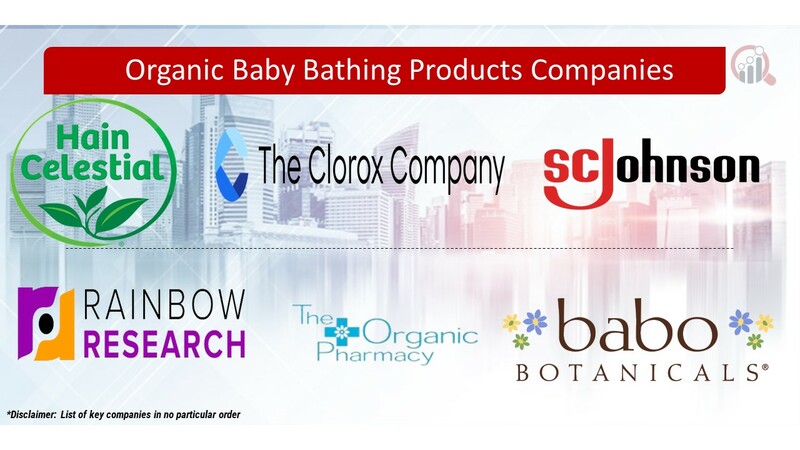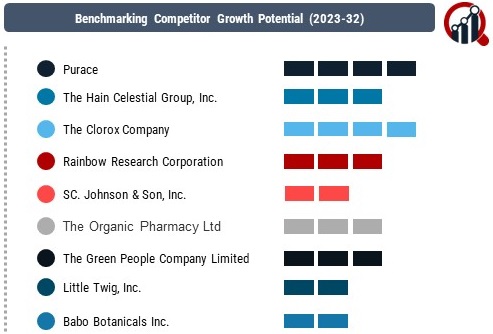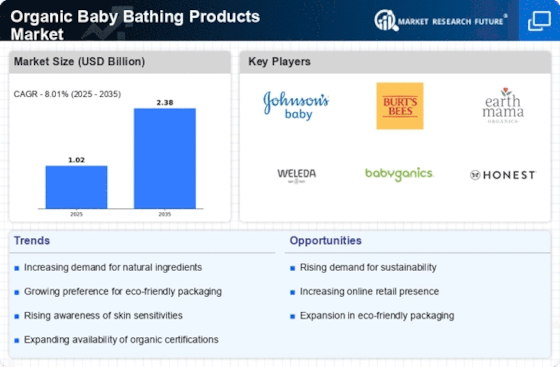Top Industry Leaders in the Organic Baby Bathing Product Market

Market share analysis within the Organic Baby Bathing Products industry involves pivotal factors. Brand reputation, formulation purity, safety certifications, pricing strategies, distribution networks, and engagement with health-conscious parents significantly impact market positioning. Brands excelling in providing gentle, hypoallergenic, and effective baby bathing products formulated with organic ingredients secure a competitive edge. Additionally, factors like positive reviews from parents, pediatrician recommendations, and brand advocacy influence market share.
New and emerging companies in the Organic Baby Bathing Products market often focus on niche aspects such as sustainable packaging, unique formulations, or specialized skincare solutions for infants. These emerging players leverage innovation in sustainable packaging materials, introduce novel organic ingredients like plant-based extracts or essential oils, and emphasize sensitive skin-friendly products to appeal to parents seeking eco-conscious and gentle baby care options. Moreover, they rely on digital marketing, collaborations with baby-focused retailers, and online platforms to gain visibility and compete with established brands.
Industry news in the Organic Baby Bathing Products market centers around trends in clean baby care, sustainability initiatives, and advancements in natural formulations. Brands invest in research to discover new organic ingredients, improve product formulations for infant skin health, and advocate for safe and natural baby care practices. Additionally, there's a notable emphasis on educating parents about the benefits of organic baby bathing products through marketing campaigns and initiatives promoting eco-friendly and safe baby care choices.
Current investment trends within this market highlight a strong focus on sustainability, research, and digital marketing strategies. Companies invest in sourcing high-quality organic ingredients, eco-friendly packaging solutions, and conducting research on infant skin health to ensure product safety and efficacy. Furthermore, investments in digital marketing campaigns, collaborations with parenting influencers, and enhancing online presence through e-commerce platforms are prevalent among industry players.
The overall competitive scenario within the Organic Baby Bathing Products market remains dynamic and parent-driven. Established players face competition from newer entrants focusing on innovative formulations, sustainability, and specific baby skincare needs. Differentiation through product quality, formulation purity, packaging sustainability, pricing strategies, marketing initiatives, and alignment with parental preferences for safe, organic, and gentle baby bathing products will determine a company's success and competitive standing in this rapidly evolving market landscape.
Industry News and Investment Trends:
- Recent purchases indicate market consolidation trends, such as Unilever's acquisition of Puracy.
- A focus on potential growth areas is shown by increased R&D expenditures, which are directed toward creative plant-based ingredient solutions, eco-friendly packaging options, and personalized technologies.
- Market expansion is further assisted by the rising public awareness of the environmental and health risks associated with traditional infant products, which is propelled by social media and recommendations from influencers.
Key Companies in the Organic Baby Bathing Products Market include –
- Purace
- The Hain Celestial Group, Inc.
- The Clorox Company
- Rainbow Research Corporation
- Johnson & Son, Inc.
- The Organic Pharmacy Ltd
- The Green People Company Limited
- Little Twig, Inc.
- Babo Botanicals Inc.












